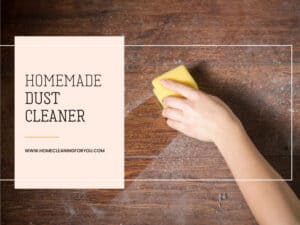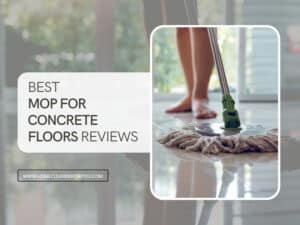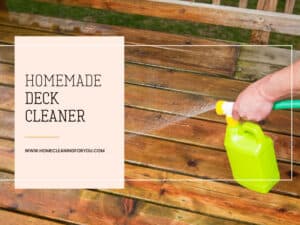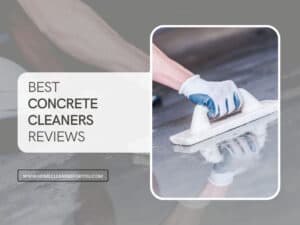7 Genius DIY Concrete Cleaners: Homemade Solutions You’ll Love
Maintaining your patio and driveway with homemade concrete cleaners is a cost-effective and easy way to restore their look. Over the years, concrete can darken, and various stains can appear. You don’t have to settle for an unpleasant patio. There are things to do that won’t take you more than one afternoon to complete.
In this article, you will learn how to make your concrete cleaner from things you own. I will show you how to clean concrete without a pressure washer (and with it) and offer you multiple recipes to try.
What Causes Concrete to Stain?
Concrete is almost zero-maintenance, but some things can stain it and be hard to remove. Here are the most common concrete stains that can ruin the look of a pretty patio, garage, or basement floor.
Concrete Compounds
Concrete contains calcium chloride, which is the most common reason for discoloration. Also, if your concrete wasn’t treated properly, the chances for discoloration are higher.
Therefore, you should use mixes with fewer calcium-chloride percentages to prevent discoloration, both indoors and outdoors.
Rust
Rust spots are common on driveways, and the main reason behind them is the ironstone mixture or coal in the concrete itself.
When the ironstone gets in contact with water and air, it degrades to rusty, bleeding spots.
The answer to how to clean rust stains from concrete and the process depends on the stain age. Fresh stains are quite simple to clean, while older stains require more attention.
Plant Fertilizers
Plant fertilizers contain different minerals, and the wind spreads tiny particles of minerals over the patio and other concrete surfaces. They can appear as small orange or yellow dots on the concrete surface.
Oil Stains
Oil stains are the most common stain type of concrete driveways. If you have parked the car inside the garage and you haven’t driven it for a while, when you finally move it, inspect the garage floor for the spots.
If any leakage happens, you will notice a dark spot on the floor.
Even the smallest leaking can cause a stain which will be there for several months.
Others Reasons
Several reasons can cause indoor and outdoor concrete surfaces to discolor. If you have never applied a concrete sealer, the concrete will eventually stain due to a chemical reaction between compound and exterior factors.
If you used a poor-quality sealer for your indoor floor or didn’t apply it properly, the stains can happen, too.
Temperature changes at the applying time, or insufficient time of mixing the concrete before the application also affect the color and appearance of the concrete surface.
Lastly, you might have spilled liquids you keep in the garage on the floor, which caused stains or your metal shelves rusted, and the rust expanded to the floor. Mold commonly stains basement floors and can be pretty persistent in humid environments.
Whatever the reasons are, you can clean stained indoor floor or driveway with the following seven homemade concrete cleaners.

7 Homemade Concrete Cleaners to Try in
You don’t have to use harsh chemicals or spend a lot of money on professional cleaning services. Some things you probably already have in your kitchen and bathroom can help you with cleaning the concrete floor, such as vinegar, laundry or dish detergent, baking soda, bleach, etc.
If you are environmentally conscious, there are simple, environmentally friendly DIY concrete cleaners, too.
Check the next recipes and find the one that works for your stains!
But, before we move on to the recipes, let’s see what kind of equipment your will need.
Bleach-Based Concrete Cleaner
What you need:
- Measuring cup
- Large bucket
- Mop for concrete floor
- Scrubbing brush
- Protective gloves
Ingredients:
- Bleach
- Water
Bleach is effective against tough stains on concrete. It contains powerful chemicals that can tackle up the toughest stains. The bleach method is also the best one if you have a large area to clean and the most budget-friendly. Also, the bleach method is excellent for cleaning the patio without a pressure washer.
Mix a 3/4 cup with liquid bleach with one large bucket of warm water. Mix it well, use a mop to apply bleach on the surface. Be careful when adding additional ingredients to the formula because bleach doesn’t do well with some chemicals. Don’t forget to wear gloves while working with bleach, as it can cause severe skin irritations.
Soak the mop in the bucket and go over the surface, just like you would normally do when cleaning the floor.
Then, let the bleach stay on the surface for several minutes, ten to 15, and then rinse it out with clean water.
That is all! However, if the surface you are cleaning contains tough stains, you’ll have to scrub them to remove them. You can use the same solution and apply it over the stain. Then, use a scrubbing brush and scrub vigorously in a circular motion to lift the dirt and remove the stain.
Rinse the area and let it dry.
Degreaser Homemade Concrete Cleaner
What you need:
- Scrubbing brush
- Bowl to mix the ingredients
- Gloves
Ingredients:
- Vinegar
- Dish soap
- Water
Degreasing the toughest oil stains is challenging, and you don’t need some fancy products. You can make a powerful DIY cleaner that will clean even the worst stains from auto mechanic driveway using vinegar, water, and dish soap.
The recipe includes a bit more scrubbing, but you will be astonished by the results.
Again, I recommend wearing gloves you are sensitive to the chemicals.
Mix an equal amount of water and vinegar and pour it over the concrete stains. Let it sit for 15 minutes and use a fair amount of dish soap and a scrubbing brush to clean the area. The vinegar will break the grease, and the soap detergent will help you remove the leftovers. For tough stains, use clean vinegar without adding water.
Rinse the detergent with clean water. This DIY homemade cleaner can help you clean the garage floor quickly and become a part of your regular cleaning routine.
Spot Treatment with Homemade Concrete Degreaser
What you need:
- Bucket
- Scrubbing brush
Ingredients:
- Vinegar
- Baking Soda
- Detergent
Baking soda and white vinegar are some of my favorite home-made cleaning solutions and they can be used almost everywhere – from declogging the pipes to removing unpleasant smells. The combination also works like a charm to remove grease and other stains on concrete.
Sprinkle a fair amount of baking soda over the areas you want to clean. Be thorough and put a larger amount on stains. Then pour pure white vinegar directly on top of it. It will dissolve the heavy grease stains. Before you use vinegar on top of baking soda, you can leave it for a couple of hours in the sun to warm up a bit. Warm vinegar is more powerful for cleaning.
You know it is working by the sizzling sound.
Wait a couple of minutes and use a laundry detergent or dish soap dissolved in a bucket of water to clean the entire area. Scrub vigorously over the stains and repeat the baking soda and white vinegar if the stain hasn’t completely faded.
Rinse the patio or driveway with water and wait until it is dry to see if you need to replace the process.
Hydrogen Peroxide Paste for Removing Stains
What you need:
- Bowl for mixing ingredients
- Scraper
- Spoon to apply the paste
Ingredients:
- 3% hydrogen peroxide
- All-purpose flour
Hydrogen peroxide is excellent for getting stains out from different surfaces and is completely safe to use on concrete.
You can make use of 3% hydrogen peroxide and all-purpose flour to make the paste that will eliminate stains on the patio.
Mix flour in hydrogen peroxide until you are satisfied with the consistency. It is an all-natural solution for stains that works surprisingly well and doesn’t require too much scrubbing.
Apply the paste over the stained area in a thick layer and let it sit overnight. I recommend checking the weather forecast before doing this method, as the rain may wash the paste and you won’t get excellent results.
Tomorrow, use the scraper to remove the paste leftovers and rinse the area.
TSP and Muriatic Acid
What you need:
- Brush with stiff nylon bristles
- Gloves
- Goggles
- Spray bottle
- Measuring cup
Ingredients:
- Trisodium phosphate
- Muriatic acid
Lastly, you can use TSP (trisodium phosphate) and Muriatic Acid to remove stains. However, I recommend using these chemicals if nothing else works, because they can be toxic and should be handled with care.
You can get them in home improvement stores.
Muriatic acid comes with cleaning instructions to follow, which depends on the product itself. Commonly, you can mix one part acid and ten parts water in the spraying bottle. Spray the acid solution over the floor and scrub until the stains are removed. Rinse thoroughly with clean water.
The alternative is to mix one cup of TSP with a gallon of hot water and apply it over the surface. Still, you’ll need a brush with nylon bristles to make the products penetrate concrete and remove the stains. Again, you need to rinse the surface with water once you are done with scrubbing.
Always wear goggles and gloves when working with highly toxic chemicals.
One-Ingredient (Coke) Homemade Concrete Cleaner
What you need:
- Scrubbing brush
Ingredients:
- Coke
The next one is a bit hard to believe, but when you try it, you’ll continue to use it. I am talking about coke.
Coke contains carbonic and phosphoric acid and works as an acid-based degreaser. It lifts the grease from the concrete surface and simplifies the cleaning. You can pour it over concrete and let it sit undisturbed for 20 minutes. Waiting longer is pointless as the bubbles will evaporate. Use a brush to scrub the dirt and pay attention to the stains.

After that, you can continue with any homemade cleaners for concrete for a full effect.
The Best Homemade Concrete Cleaners for Pressure Washer
What you need:
- Pressure washer
- Bowl to mix ingredients
- Measuring cup
Ingredients:
- Dish detergent
- Bleach
- Water
- Baking soda (optional)
A pressure washer is a practical tool that can make cleaning the patio much simpler. You can buy specialized products for pressure cleaning, or you can make one yourself.
You probably don’t clean the patio often, maybe twice a year. Therefore, there is no excess product, you can make just the amount of cleaning solution you every time. There is no spilling or throwing away with homemade cleaners.

Use dish detergent, one gallon of hot water, and 32 fluid ounces of bleach. Mix the ingredients, and there you have it – powerful concrete cleaner. Put the solution in your pressure washer and follow the tool’s instruction to clean the area.
The alternative is mixing bleach and baking soda in a 1:2 ratio with one gallon of water.
Bonus Tips for Cleaning Concrete Floors with Homemade Cleaners
Use a broomstick and a dustpan to get rid of any dirt and debris on your patio or driveway before you start cleaning it with homemade cleaners. You can also use a vacuum for concrete floor to remove debris quicker.
If you own a pressure washer, you can clean the area easier. It can remove dirt, mold, and lighter stains easier.
Then, pour a bucket of warm water on the surface, to clean the surface easier.
How to Clean Painted Concrete Floor?
Cleaning painted concrete floors is a bit simpler because you won’t have to use heavy chemicals. A dishwasher soap dissolved in a bucket of warm water is enough. You should stay away from bleach and vinegar because they can chip the paint off the floor.

How to Absorb Liquids from Your Concrete Floor?
Let’s say you spill liquid that can stain the concrete, such as oil, and you don’t want to spread the liquid by using a broom to remove it.
Two things are useful in absorbing liquids quickly. Those are baking soda and cat litter.
If you own a cat, pour the litter over the oil puddle and wait half an hour until the liquid is completely absorbed. Then continue with the cleaning.
The efficient alternative for people who don’t have a cat is to use baking soda. It might need more time to absorb everything, but the results will be great.
How to Clean Indoor Concrete Floors with Homemade Cleaners?
Cleaning indoors concrete floors is a bit trickier because you cannot use a pressure washer. You can use any of the DIY cleaners described above using bleach, hydrogen peroxide, vinegar, baking soda, etc.
When cleaning indoor concrete floors, open the windows and create airflow. It will keep the area ventilated and speed up the drying process.
When cleaning concrete floors indoors, I recommend starting from the mild homemade cleaners and detergents and only reach for bleach or TSP if nothing else works.
Work in small sections and rinse each area as you complete it to dry the surface easier.
Can you Prevent Stains on Concrete?
The only way to prevent stains on the concrete surface is to seal it. Stains aren’t only aesthetical problems; they can permanently damage the concrete and cause cracking. That way, concrete stains can affect the value of your property.
One way to protect the concrete is to seal with natural finish products. These products Fluoropolymers, which help them to repel oil stains. Additionally, the sealer will prevent other nasty things from penetrating to concrete and causing tough stains. So, you can clean only the surface layer.
Sealers with clear silane or siloxane are easy to apply with a roller or sprayer, and you can do it at home.
If you want to protect indoor concrete floors from staining, I recommend using a masonry primer with a masonry topcoat. It will hide older stains and ensure a good look on your concrete floor.
For outdoor concrete surfaces, I recommend applying new coats every two years.
Homemade Concrete Cleaners – The Truth
The truth about homemade cleaners for concrete is that they work. Some combinations are more effective than others, but these cleaners are just as effective as store-bought cleaning products. In most cases, DIY cleaners aren’t toxic, easy to make, and budget-friendly.
The home concrete cleaner remedies include various ingredients. But, I find vinegar, baking soda, hydrogen peroxide, laundry detergent, and bleach as most effective in mixing with water to make cleaners.
Have you tried homemade cleaners for concrete before? What worked the best for you?
Like and share the article if you enjoy it, and come back for more cleaning tips!








Kevin Jones
Founder & Chief Home Organization Strategist
Expertise
Home Organization & Decluttering, Efficient Cleaning Methods & Stain Removal, Sustainable Cleaning Practices, DIY Home Maintenance & Repairs, Space Optimization & Storage Solutions, Budget-Friendly Home Care Strategies
Education
University of Texas at Austin
Kevin Jones is the Founder and Chief Home Organization Strategist at HomeCleaningForYou.com.
He earned a Bachelor of Science in Interior Design from the University of Texas at Austin, focusing on space planning and sustainable design. Specializing in home organization, decluttering, and budget-friendly home care, he helps homeowners create functional and stylish spaces.
Kevin has been featured in lifestyle publications and has collaborated with eco-friendly brands on home organization solutions. He shares his expertise through DIY guides, workshops, and online tutorials. Passionate about minimalism, he enjoys testing new organization methods and exploring sustainable living ideas.